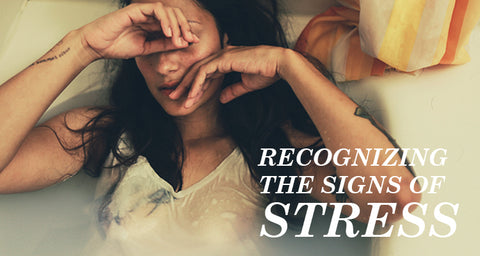
It’s Stress Awareness Month, and in our blog series this month we're promoting the idea: let’s all de-stress! But it’s not always easy is it? Even harder is recognizing that we’re even stressed in the first place. We might have the occasional symptom of stress that we put down to something else. A headache when we haven’t had enough water, neck tension when we’ve been to the gym, feeling irritable when we’re tired.
But all three can equally also be signs of stress. Or, we might be so used to the symptoms of stress that they just become an unnoticeable part of everyday life!
So what should we be looking out for?
The Physical Symptoms of Stress
If you’re regularly suffering any (or all) of the following, then you could be suffering from stress. If any of them worry you, take it from us, and talk to your doctor.
- Feeling constantly tired, even when you’ve had a decent amount (7-8 hours) of sleep
- Difficulty getting to sleep, staying asleep and getting quality sleep
- Experiencing bad dreams or nightmares
- Headaches, particularly around the front of the head
- Feeling light-headed, dizzy, nauseous or even fainting
- Suffering stomach upsets, constipation, indigestion, heartburn or general changes to bowel habits
- Feeling tense and having aches in your shoulders, neck and/or back
- Feeling tight-chested or experiencing chest pains (this is serious, seek medical attention)
- Developing high blood pressure (usually picked up during a doctor’s exam)
- Grinding your teeth or clenching your jaw during your sleep and waking up with an achy jaw (or doing this during the day, too)
- Finding it hard to catch your breath (hyperventilating)
- Experiencing panic attacks
- Losing interest in, or failing to gain pleasure from sex
- Developing habits such as biting your nails, pulling at your hair or picking at areas of skin (which may develop such that they cause bleeding or bald patches of the scalp)
The Emotional Symptoms of Stress
Of course, being stressed doesn’t just manifest itself in physical signs and symptoms. There are emotional ones too, that might impact the way you think, feel and act. If any of these relate to you for much of the time, it might be time to take stock of what’s causing you to be stressed:
- Feeling unable to make a decision
- Feeling worried, anxious or scared
- Worrying that you’re overloaded and can’t cope
- Losing your sense of humor and interest in the things that previously made you happy
- Feeling like you can’t switch off, with thoughts constantly racing around your head
- Feeling restless
- Feeling agitated, angry, impatient or irritable with colleagues, loved ones and even strangers
- Having a constant feeling of dread
- Feeling alone or like no one cares about you
- Avoiding tasks that need to be done (‘burying your head in the sand’)
- Feeling down, sad, tearful or depressed
- Being worried about your physical health
- Over-eating, under-eating, drinking more alcohol or taking up a new habit such as smoking or drug taking
Coping with Stress
These signs and symptoms are warning signs that perhaps you need to slow down the pace. Here are our top ten tips for de-stressing. See which ones work for you. You may be surprised! (Who’s putting the kettle on…?)






